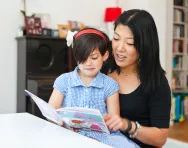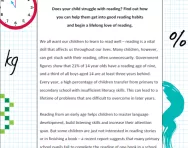Important update from TheSchoolRun
For the past 13 years, TheSchoolRun has been run by a small team of mums working from home, dedicated to providing quality educational resources to primary school parents. Unfortunately, rising supplier costs and falling revenue have made it impossible for us to continue operating, and we’ve had to make the difficult decision to close. The good news: We’ve arranged for another educational provider to take over many of our resources. These will be hosted on a new portal, where the content will be updated and expanded to support your child’s learning.
What this means for subscribers:
- Your subscription is still active, and for now, you can keep using the website as normal — just log in with your usual details to access all our articles and resources*.
- In a few months, all resources will move to the new portal. You’ll continue to have access there until your subscription ends. We’ll send you full details nearer the time.
- As a thank you for your support, we’ll also be sending you 16 primary school eBooks (worth £108.84) to download and keep.
A few changes to be aware of:
- The Learning Journey weekly email has ended, but your child’s plan will still be updated on your dashboard each Monday. Just log in to see the recommended worksheets.
- The 11+ weekly emails have now ended. We sent you all the remaining emails in the series at the end of March — please check your inbox (and spam folder) if you haven’t seen them. You can also follow the full programme here: 11+ Learning Journey.
If you have any questions, please contact us at [email protected]. Thank you for being part of our journey it’s been a privilege to support your family’s learning.
*If you need to reset your password, it will still work as usual. Please check your spam folder if the reset email doesn’t appear in your inbox.
Why it’s important to make time for reading

Reading is probably the most important skill that your child will learn. It opens up a whole new world of learning and imagination, and your help is essential.
The more you help your child at home, the easier they will find it to develop the vital skill of reading. However, if you work, run a house, have other children, and rarely get enough sleep, it’s a sad fact that reading with your child can start to feel like just another “to-do” to tick off your list.


Claim A FREE Book Reviews Activity Pack!
- A huge collection of creative writing & reading comprehension resources
- Explore texts, deepen understanding, share opinions
- For Year 1 to Year 6
You might have just got home after a 12-hour day, have dinner to cook, packed lunches to prepare, clothes to wash and dry, cats to feed, not to mention Holby City to watch (we all need a guilty pleasure!).
But spending some time reading a book about a not-very scary but very hairy Gruffalo or a wayward and Horrid boy called Henry actually gives you the time to breathe, relax, and spend some quiet time with your child which can help you to forget the hustle and bustle of your hectic life, even for a short while.
So choose a time when you’re both relaxed and before you both get too tired, settle down somewhere quiet and comfortable, and make the time to read with your child.
Why it matters
When you share a book with your child at home, you are showing them that you think reading matters. You are giving your child your full attention and that tells them that reading is a special activity that is worth time and trouble. And children who get help and encouragement at home learn to read much better than those who only read at school.
When your child is under five, reading bedtime stories and enjoying books together is the best preparation for learning to read. As your child learns to read, usually between ages five and seven, you still have a very important role to play in helping them to enjoy books and develop a lifelong love of books and stories.
How to inspire them
When your child is first learning to read, support and encourage their interest in book and stories through reading to them. Tell your child a story that you’ve made up from your imagination, perhaps using people or animals they know or characters from other stories that they are familiar with but add your own twist.
Let your child choose the book you read together. Don’t worry about re-reading a favourite book night after night, add some funny voices and mannerisms and your child will look forward to it each time. Re-reading familiar books can actually increase your child’s confidence in reading.
Let your child see you reading, too. Dads in particular may want to encourage their sons to read by picking up a book, magazine or newspaper themselves. Above all, aim to make the reading experience a fun, cosy and time together that you both enjoy and look forward to.








